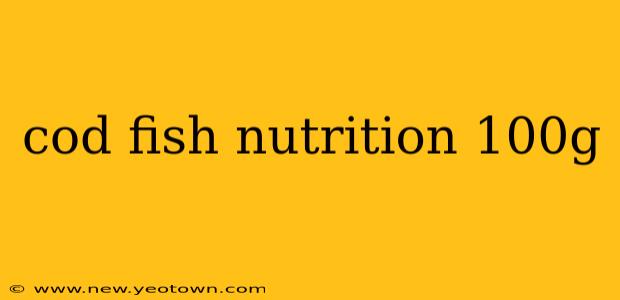The ocean's bounty offers a treasure trove of healthy foods, and cod fish stands out as a nutritional champion. This flaky white fish is not only delicious but also packed with essential nutrients that benefit your overall well-being. Let's dive into the nutritional profile of 100g of cod and explore why it deserves a prominent place on your plate.
Imagine a crisp autumn evening. You’re nestled by a crackling fire, the aroma of freshly baked bread mingling with the savory scent of pan-seared cod. This isn't just a delicious meal; it's a nutritional powerhouse fueling your body with essential vitamins and minerals.
What are the nutritional benefits of cod?
Cod is a lean protein source, meaning it's low in fat and high in protein. A 100g serving provides roughly 20 grams of protein, crucial for building and repairing tissues, supporting immune function, and maintaining healthy muscles. Beyond protein, cod is rich in essential vitamins and minerals, including:
- Vitamin B12: Essential for nerve function, red blood cell formation, and DNA synthesis. Cod is an excellent source.
- Omega-3 fatty acids: These healthy fats are vital for brain health, heart health, and reducing inflammation. Cod offers a decent amount, contributing to overall wellness.
- Selenium: A powerful antioxidant that protects cells from damage and supports thyroid function.
- Niacin (Vitamin B3): Plays a key role in energy metabolism and helps maintain healthy skin.
- Phosphorus: Important for bone health, energy production, and cell signaling.
- Iodine: Essential for thyroid hormone production, crucial for metabolism and growth.
How many calories are in 100g of cod?
A 100g serving of cod typically contains around 80-90 calories, making it a low-calorie, high-protein option ideal for weight management. This makes it a versatile choice for various diets and health goals.
Is cod high in mercury?
This is a common concern. While some larger predatory fish can accumulate high levels of mercury, cod generally has low mercury levels, making it a safe choice for regular consumption. However, it's always best to check with your local health authorities for specific advisories regarding mercury levels in your region's fish supply.
What are the best ways to cook cod?
The versatility of cod makes it an excellent choice for various cooking methods. From baking and pan-frying to grilling and steaming, the possibilities are endless. Its delicate flavor pairs well with herbs, spices, and various sauces. Experimenting with different cooking techniques and flavor combinations can make each meal a unique culinary experience.
How much cod should I eat per week?
The recommended amount of fish consumption varies depending on individual needs and dietary guidelines. Generally, incorporating cod (and other fatty fish) into your diet 1-2 times a week is considered beneficial for reaping its nutritional advantages. Remember to consult your doctor or a registered dietitian for personalized dietary advice.
Is cod good for weight loss?
Due to its high protein content and low calorie count, cod can be a valuable asset in a weight-loss diet. Protein promotes satiety, keeping you feeling full and reducing overall calorie intake. It also supports muscle mass, which is crucial for boosting metabolism and burning more calories.
What are some alternatives to cod?
If cod isn't available or if you're seeking variety, other white fish such as haddock, pollock, or halibut offer similar nutritional benefits. Always prioritize sustainable sourcing when making your seafood choices.
In conclusion, cod fish is a nutritional powerhouse offering a delicious and healthy way to incorporate essential vitamins, minerals, and protein into your diet. Its low calorie and mercury content make it a versatile option for various dietary needs. By incorporating this versatile fish into your weekly meal plan, you're investing in your overall health and well-being. Remember to choose sustainably sourced cod whenever possible, ensuring responsible fishing practices are upheld.

